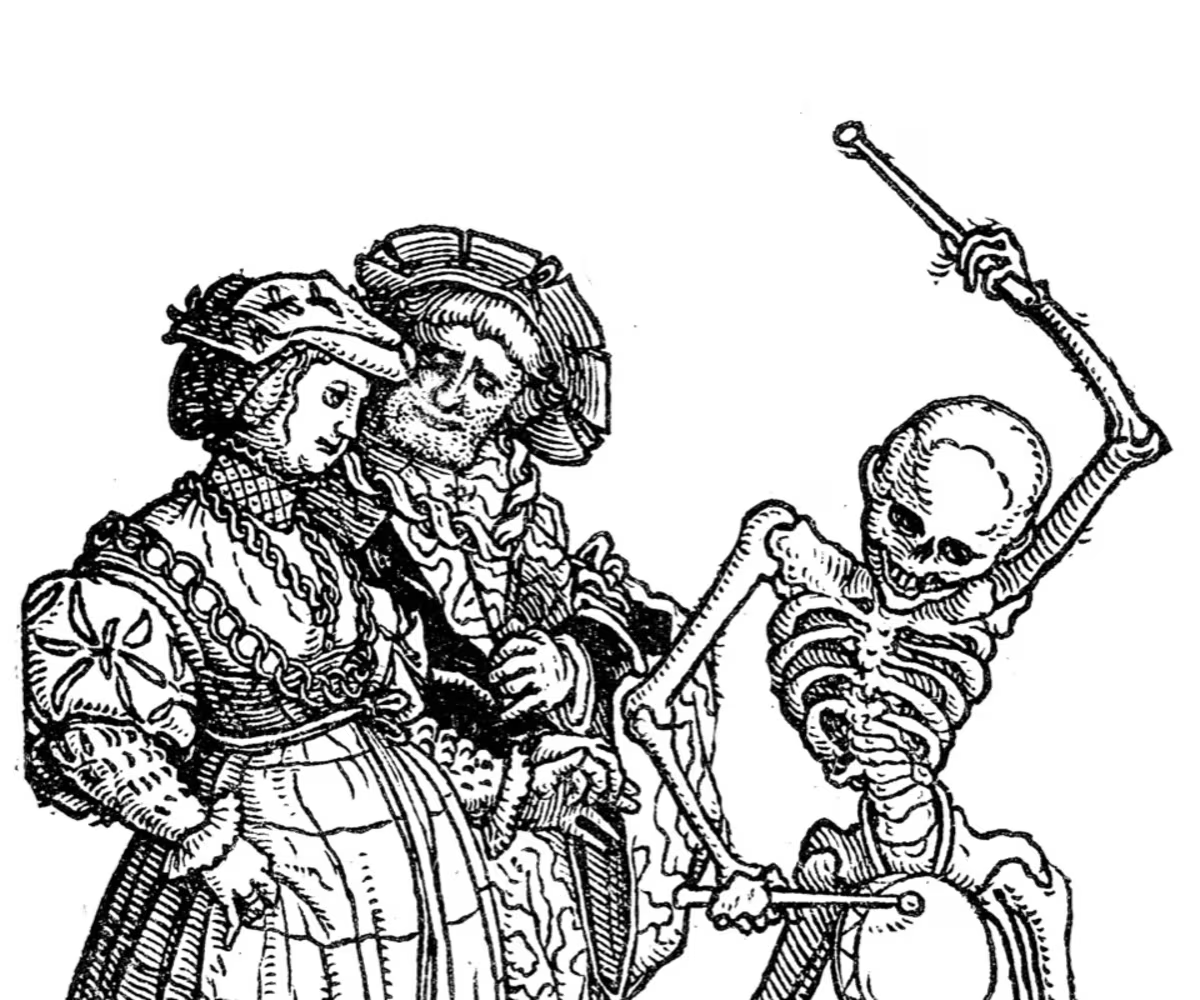Wondrous Machine
Danse Macabre - the 1600s and Chaos
Sam Brown (lute), Andrew Rennie (tenor)

The 'Danse Macabre' was part of a wider constellation of allegories that acknowledged the darkness of a life that ended in death within the joy of music. Dancing manias that ended in broken bones and death; reminders that under all the pomp and richly-clothed power lurked the bare bones of skeletons. As the 1600s slipped into chaos and war, this foreshadowing became ever more acute and entwined with the strangeness and dissonance of the early English Baroque.
Our programme includes pieces by John Danyel and Henry Purcell as well as less well-known works by William Webb, John Banister, John Blow and astonishingly beautiful vocal work by Henry Lawes’ brother William Lawes who, though assigned away from the front-line to keep him from danger, was “casually shot” by a Parliamentarian at Rowton Heath, near Chester, in 1645. Neither of Lawes' pieces are well-known but one of them, 'O let me still and silent lie' only appears in his brother’s original autograph manuscript in the British Library detailing three hundred songs, few of which are either known or performed now.
Programme:
Here the Deities (Purcell)
Musick for a While (Purcell)
Powerful Morpheus (Webb)
She weepeth sore in the night (W Lawes)
O let me still and silent lie (W Lawes)
Grief keep within (Danyel)
Drop not (Danyel)
Have all our passions (Danyel)
Poor Celadon (Blow)
Amintas that true hearted swain (Banister)
O Solitude (Purcell)
I attempt from Love’s Sickness (Purcell)
She loves and confesses too (Purcell)
'Strikingly intimate... well-judged story-telling entwined with the haunting, sparse beauty of Purcell and Dowland'
'Like nothing I've been to before - playful, serious, beautiful, chilling, provocative in just the right way!'
 Wed, 4 June 2025
Wed, 4 June 2025 Old Operating Theatre, London
Old Operating Theatre, London 7:00pm
7:00pm £18.50
£18.50
Full Event Details

A discursive tour of some unusual and strikingly beautiful 1600s vocal works - Danyel and Purcell as well as Webb, Banister, Blow and Lawes.
The 'Danse Macabre' was part of a wider constellation of allegories that acknowledged the darkness of a life that ended in death within the joy of music. Dancing manias that ended in broken bones and death; reminders that under all the pomp and richly-clothed power lurked the bare bones of skeletons. As the 1600s slipped into chaos and war, this foreshadowing became ever more acute and entwined with the strangeness and dissonance of the early English Baroque.
Our programme includes pieces by John Danyel and Henry Purcell as well as less well-known works by William Webb, John Banister, John Blow and astonishingly beautiful vocal work by Henry Lawes’ brother William Lawes who, though assigned away from the front-line to keep him from danger, was “casually shot” by a Parliamentarian at Rowton Heath, near Chester, in 1645. Neither of Lawes' pieces are well-known but one of them, 'O let me still and silent lie' only appears in his brother’s original autograph manuscript in the British Library detailing three hundred songs, few of which are either known or performed now.
Programme:
Here the Deities (Purcell)
Musick for a While (Purcell)
Powerful Morpheus (Webb)
She weepeth sore in the night (W Lawes)
O let me still and silent lie (W Lawes)
Grief keep within (Danyel)
Drop not (Danyel)
Have all our passions (Danyel)
Poor Celadon (Blow)
Amintas that true hearted swain (Banister)
O Solitude (Purcell)
I attempt from Love’s Sickness (Purcell)
She loves and confesses too (Purcell)
'Strikingly intimate... well-judged story-telling entwined with the haunting, sparse beauty of Purcell and Dowland'
'Like nothing I've been to before - playful, serious, beautiful, chilling, provocative in just the right way!'
Venue Details & Map

Location
Old Operating Theatre, London
Old Operating Theatre, 9a St Thomas St, London SE1 9RY

